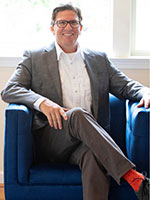Finding Purpose on a Smoldering Island
Nate McKeever (EMDC ‘22) runs a successful contracting firm in California, but the road to that success started amid a humanitarian crisis.
Nate McKeever (EMDC ‘22) was standing watch on the deck of a U.S. Navy ship in southeast Asia off the coast of what would soon become the new nation of East Timor when he found his life’s purpose.
It was 1999, McKeever was still a teenager, and from his vantage point on the ship deployed to provide humanitarian aid, he watched the territory — then under Indonesian control — burn.
“The whole island was on fire," he said. "It was smoky, and there were refugees being transported off the island. It was a mess. I watched that, and I remember thinking I wanted to do something in the service of other people.”
 Now a newly minted graduate of Northwestern Engineering's Master of Science in Executive Management for Design and Construction (EMDC) program, McKeever leads his own California-based company – McKeever Sustainable Construction – with a simple mission: Design and build things with a purpose that promotes sustainability for his customers.
Now a newly minted graduate of Northwestern Engineering's Master of Science in Executive Management for Design and Construction (EMDC) program, McKeever leads his own California-based company – McKeever Sustainable Construction – with a simple mission: Design and build things with a purpose that promotes sustainability for his customers.
In doing so, McKeever is following his passion.
“When I say ‘sustainable,’ that’s not only the environment or the ecological effect,” he said. “It’s the feeling you get when you are in places that we build, and ‘sustainable’ also means the places we build are assets that generate revenue and peace of mind for our customers.”
What that looks like in practice leads McKeever to a story about a customer who asked him to build a barn. The result wasn’t your typical place to shelter animals and store hay.
“If you want me to build a barn, I’m going to put solar on this barn to make it sustainable," he said. "I’m going to do all the rainwater harvesting off the rooftop. I’m going to put in an electric car charging station, and I'm going to put an Airbnb in the attic of the barn so it generates revenue,” he said. “That’s what we do.”
McKeever’s company has existed in some form since 2006, in its current iteration since 2011, and is now thriving more than ever thanks to his experience with the EMDC program. Since he started the program in 2020, he’s obtained two additional contractors licenses beyond his electrical contracting designation. Combined with the lessons he took away from the program itself, McKeever is finding increased financial success on the other side of graduation.
“I started to understand I could do much more if I was a prime contractor rather than a subcontractor,” he said. “I made that change because of EMDC while I was still a student in the program, and my revenue has since tripled and my profits have doubled.”
McKeever said he might never have been in EMDC were it not for one man: Raymond Krizek, director of the program and Stanley F. Pepper Professor of Civil and Environmental Engineering. McKeever was casting a wide net looking for a master’s program to help spark his career growth and was considering a variety of options. One evening during the search, his phone rang. It was Krizek.
That call not only led McKeever to choose the EMDC program, but it sparked a relationship between the two that continues to this day. So committed was Krizek to having McKeever join the EMDC program that he spent time explaining the value of the program and its potential to McKeever’s wife, a gesture for which McKeever remains grateful to this day..
“It was a big decision for me as a family person,” said McKeever, father of two children, now ages seven and three. “Instead of evenings with my family, I was going to be in the garage on the computer one night a week and on the weekends. That Krizek would take the time to chat with my wife made a huge difference.”
Though his time in the EMDC program is in the past, McKeever remains an active member of the program's network of professors and alumni – something he encourages new students to emulate.
“There’s a reason these people are professors," he said of the faculty. "It’s because they want to share their world and they want you to be successful and they want you to be happy. So get their cell phone numbers and call them up. Take them to coffee, get to know them, and tap their brains.”

